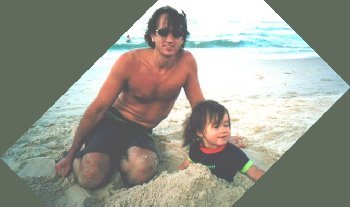| LinkExchange Member | Free Home Pages at GeoCities |
| LinkExchange Member | Free Home Pages at GeoCities |

By HILARY MCPHEE

There's a beach where I go to get my bearings--- my most familiar place for as long as I can remember. Just a strip of sand and surf, but one of those miraculous Australian places on a long stretch of coast only a couple of hours from the city.
I think of it like a slowly evolving map on the edge of the world. While the cliff face crumbles imperceptibly and the sand dunes change shape after storms and high tides, the people who find this beach become part of the place.
Only half a dozen families holidayed here when I was a child. This was an unfashionable part of the coast where old bathers and sandshoes were standard, and we snorted at the smart people in their bikinis and sunglasses speeding past to somewhere only half as good.
We knew about the Aboriginal shell middens in the dunes and nothing at all about the people who'd left them. We built fires on the beach and night-netted fish in the surf at sundown, which was probably illegal.
The catch was cooked and eaten by the light of the fire. And mothers produced egg-and bacon pies and bottles of ginger beer because that's what mothers did in those days.
This was an unspoiled enclave, Anglo-Celtic, bunkered but blissful. We knew it was paradise and I think we also knew we weren't the only ones entitled to it,

The Greek and Italian all-day fishermen were the first to arrive. While the women doled out food and dozed on rugs up under the cliffs, the men and boys fished all day until their buckets were filled with mullet and salmon.
But it is just as true that the place handled the lot of us. Who knows how many nationalities might be counted among the people fishing on the beach now, or among the kids splashing in the shallows or making elaborate constructions in the sand decorated with seaweed and shells..
Over the years there have been more changes. Houses clamouring for views have sprouted everywhere. Surfboards have changed their shape again and again. Clothes are less shabby, cars more reliable and the store sells good bread and chillies and local fetta cheese..
But last weekend, walking along the beach at low tide in the early morning light, apart from a power-walking woman in lycra with weights and headphones, it could have been any time.
Far off, silhouetted against the sky, is a group of women in ankle-length skirts - and for a moment I imaglne they are Edwardian ladies about to take the waters, wrapped modesty against the sun..
Then out of the dunes come a bunch of surfers - boys and girls.
And for a long, glorious moment, I picture these decorous young women also with surfboards running into the sea. There they go paddling out, turning to face the shore and rising to their feet as the huge swell catches them. Then, heads thrown back, hijabs billowing, they are waving at all of us there on the shore..
It's not we who live here already who do the hard work, said Neville Roach, the former chairman of the Council for Multicultural Australia. It's the people who come here to start again. They are the ones who change. It's their cultures that must do most of the adapting to us and to this place. We are only asked to share.
.
.
Then came Turks in large numbers, also fishermen. And then Vietnamese families arrived
on the rocks searching the pools for abalone and pippis and filling cotton bags.
A few blokes muttered about protecting their fishing spots from the yellow peril - and it's true that the fishing these days is not a patch on what it was..
Even at this hour, there are a few people around - a bunch of surfers waiting for a set far out on
the pale grey sea, a solitary fisherman adjusting his lines,people throwing sticks for happy dogs.
Two young fathers and their children are building a row ofsandcasties - the men with a zeal betraying that the pleasure is more their own than their kids'. A sandy baby still in her sleeping suit is waving a piece of
kelp. I picture her being plucked from her cot before she could wake her mother - and all of them creeping from the house, shushing each other as they gather up buckets and spades and apples..
Not until I am quite close do I see that they are seven young Muslim girls, arms linked - in long dark coats, their hair covered in white hijabs, utterly engrossed in each other, talking excitedly in their own language..
Australian teenagers in wetsuits, clutching their boards, motley dogs at heel. They run down the beach and leap into the waves, shouting and laughing as they go - and, as they make their way out beyond the break, the gids in their hijabs stand still and watch them.
 Please mail any comments and suggestions to:
robin_knight@bigfoot.com
Please mail any comments and suggestions to:
robin_knight@bigfoot.com


©Robin Knight, 2001.